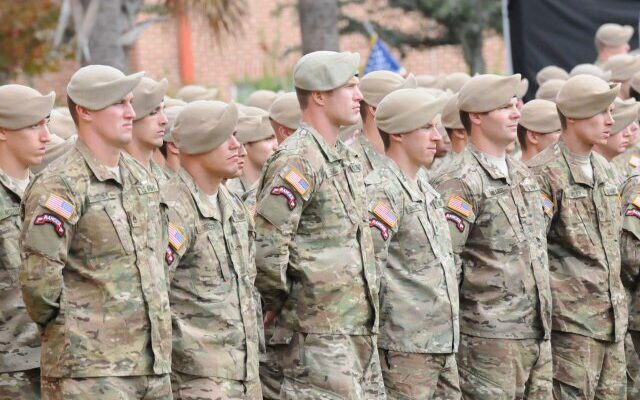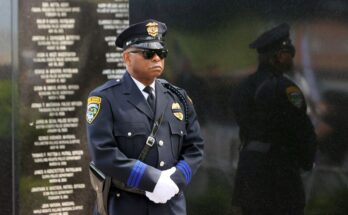Royal Air Force Recruitment: Are you dreaming of soaring high in the skies, defending your nation, and being part of an elite team of individuals who embody honor, courage, and commitment?
If you’ve ever aspired to join the Royal Air Force (RAF), your dream might be closer to reality than you think. The RAF offers a wide range of recruitment programs, each tailored to specific skills, interests, and career goals.
In this comprehensive guide, we’ll delve into the diverse opportunities that the Royal Air Force provides to individuals like you who aspire to be part of this prestigious institution.
Overview of the Royal Air Force
The Royal Air Force (RAF) holds a rich history and plays a pivotal role in the realm of defense. In this section, we will delve into the historical backdrop of the RAF, emphasizing its crucial position in national security and outlining some of its key missions and operations.
A. Brief History of the RAF
Established on April 1, 1918, the Royal Air Force is the United Kingdom’s aerial warfare force and the world’s oldest independent air force. Its formation was a response to the growing significance of aviation during World War I. Initially comprising the Royal Flying Corps and the Royal Naval Air Service, the RAF was created as a unified entity to consolidate and coordinate aerial operations.
Over the decades, the RAF has evolved, adapting to technological advancements and changing global circumstances. It has played a crucial role in numerous conflicts, including World War II, the Falklands War, the Gulf War, and more recently, operations in Afghanistan and against ISIS.
B. Role and Significance in the Defense Sector
The RAF holds a position of paramount importance in the defense sector, contributing significantly to the UK’s national security. It serves as a key component of the country’s tri-service defense forces, working in synergy with the British Army and the Royal Navy. The RAF’s primary mission is to provide aerial defense and power projection capabilities.
One of the key aspects of the RAF’s role is maintaining the integrity of UK airspace. It is responsible for conducting air surveillance, intercepting potentially hostile aircraft, and responding to security threats in the skies. Furthermore, the RAF plays a pivotal role in projecting British military power globally, allowing the UK to participate in international missions and support its allies.
C. Key Missions and Operations
The Royal Air Force is involved in a wide range of missions and operations, both at home and abroad. Some of its key missions and operations include:
- Air Defense: The RAF is responsible for safeguarding UK airspace, 24/7, 365 days a year. Quick Reaction Alert (QRA) aircraft are on standby to intercept and respond to any potential threats.
- Humanitarian Assistance: The RAF provides vital support during humanitarian crises, such as delivering aid and medical supplies to disaster-stricken areas or evacuating citizens from conflict zones.
- Combat Operations: The RAF has been actively involved in combat operations, including airstrikes against terrorist organizations and providing close air support to ground forces.
- Search and Rescue: Historically, the RAF has played a significant role in search and rescue missions, saving lives in challenging conditions.
- Transport and Logistics: The RAF transports troops, equipment, and supplies to operational theaters around the world, facilitating military deployments and peacekeeping missions.
However, the Royal Air Force has a storied history and remains a vital pillar of the UK’s defense sector. Its multifaceted role encompasses safeguarding airspace, projecting military power, and undertaking various missions to protect national interests and global security.
The Significance of Royal Air Force Recruitment
Here, we will delve into the importance of RAF recruitment, highlighting why it is crucial for the organization, the need for skilled personnel to maintain air superiority, and the significant impact the RAF has on national security.
A. Why RAF Recruitment is Vital
RAF recruitment stands as a linchpin for the organization’s overall functionality and mission fulfillment. Without a steady influx of talented and dedicated individuals, the RAF would be unable to maintain the level of operational readiness required to defend the nation’s interests at home and abroad. Recruiting new personnel ensures that the RAF remains a formidable force capable of responding to emerging threats, both immediate and long-term.
B. The Need for Skilled Personnel
One of the RAF’s primary roles is to maintain air superiority, a task that demands a highly skilled and well-trained workforce. Skilled personnel are essential in operating cutting-edge aircraft, managing complex technologies, and executing strategic air operations. In an era of evolving and increasingly sophisticated threats, having a pool of skilled individuals is imperative for the RAF to stay ahead of the curve and effectively protect the nation’s airspace.
C. RAF’s Impact on National Security
The Royal Air Force has a profound impact on the United Kingdom’s national security. It serves as a critical component of the country’s defense apparatus, deterring potential adversaries and ensuring swift responses to any hostile actions. RAF personnel are responsible for safeguarding the skies, defending against aerial threats, and supporting operations that contribute to the nation’s overall security. The recruitment of capable and dedicated individuals directly bolsters the RAF’s ability to fulfill its mission and protect the nation.
However, the significance of Royal Air Force recruitment cannot be overstated. It is the lifeblood of the RAF, ensuring that the organization remains capable, adaptable, and ready to face the challenges of the modern world. The recruitment of skilled personnel not only upholds air superiority but also plays a pivotal role in safeguarding national security, making it an essential endeavor for both the RAF and the United Kingdom as a whole.
Current Royal Air Force Recruitment Programs
Whether you’re a recent graduate, a seasoned professional, or someone seeking a new career path, the RAF provides unique opportunities for personal and professional growth.
Eligibility Criteria:
- Age and Education: The RAF has specific age and educational requirements, which vary depending on the role. Generally, applicants must be between 16 and 47 years old. Educational qualifications range from GCSEs for some roles to a degree for officer positions.
- Nationality and Residency: Applicants must be British citizens, Commonwealth citizens, or dual nationals. Certain residency criteria also apply, usually involving a minimum period of residence in the UK.
- Fitness and Health: Physical fitness is crucial in the RAF. Candidates must pass a fitness test and a thorough medical examination to ensure they meet the RAF’s health standards.
- Background Checks: A background check, including a criminal record check, is a standard part of the RAF application process.
Application Process:
- Online Application: The first step is completing an online application on the RAF’s official website. This form collects basic information about you and your qualifications.
- Aptitude Test: After submitting your application, you’ll be invited to take an aptitude test, assessing your skills and suitability for a role in the RAF.
- Interview and Assessment: Successful candidates are then invited to an interview and assessment center, where they undergo further testing, including physical and psychological evaluations.
- Final Selection: Those who pass all stages of the assessment are then considered for selection, based on the needs of the RAF and the candidate’s performance throughout the process.
Emphasizing Diversity and Inclusivity
The RAF is committed to fostering a diverse and inclusive environment. This commitment is reflected in its recruitment process, which actively encourages applications from individuals of all backgrounds, irrespective of gender, race, religion, or sexual orientation. The RAF believes that diversity strengthens its teams and enhances its capability to undertake various missions effectively.
Key Points in RAF’s Diversity Drive:
- Outreach Programs: The RAF runs various outreach programs aimed at underrepresented groups, to inform them about career opportunities and encourage them to apply.
- Inclusive Policies: Policies are in place to ensure fair treatment for all applicants, with a focus on equality and respect for individual differences.
- Support Networks: The RAF offers support networks for different groups, including women, ethnic minorities, and the LGBTQ+ community, ensuring a supportive environment for all its personnel.
However, the RAF’s recruitment programs are designed to be accessible and fair, emphasizing the importance of diversity and inclusivity. By meeting the eligibility criteria and successfully navigating the application process, candidates from all walks of life can embark on a fulfilling career with the Royal Air Force.
How to Apply for the Royal Air Force: A Comprehensive Guide
Step-by-Step Application Process
- Initial Research: Start by visiting the official Royal Air Force website. This will provide you with up-to-date information on various roles, requirements, and recruitment processes.
- Choosing Your Role: Assess the different roles available and choose one that aligns with your skills, interests, and qualifications.
- Online Application: Fill out the application form on the Royal Air Force website. Ensure that all information is accurate and complete.
- Aptitude Test: After submitting your application, you’ll be invited to take an online aptitude test, which assesses your cognitive abilities.
- Health Assessment: You’ll undergo a medical examination to ensure you meet the health standards of the RAF.
- Fitness Test: A physical fitness test will be required to evaluate your physical capabilities and endurance.
- Interview Process: Successful candidates will be invited for an interview, which is a crucial step in the selection process.
- Final Selection: Post-interview, successful candidates will receive an offer and will be given details on the next steps, including training.
Tips for Preparing for the Selection Process
- Physical Fitness: Begin a regular fitness regimen focusing on the specific requirements of the RAF fitness test. This could include running, push-ups, and sit-ups.
- Academic Preparation: Review relevant materials for the written tests, focusing on areas such as mathematics, reasoning, and comprehension.
- Mock Tests: Practice with online mock tests to familiarize yourself with the format and types of questions in the aptitude test.
Excelling in the Interview
- Research the RAF: Understand the history, values, and current missions of the Royal Air Force.
- Role-Specific Knowledge: Have a clear understanding of the role you are applying for and how it fits into the RAF’s mission.
- Practice Common Interview Questions: Prepare answers for common interview questions and practice speaking clearly and confidently.
- Dress Appropriately: Wear formal attire that shows professionalism and respect for the process.
Remember, preparation and research are key to succeeding in the RAF application process. Good luck!
FAQs about Royal Air Force Recruitment
Here, we address some of the most common questions and misconceptions about the recruitment process for the Royal Air Force (RAF). Our goal is to provide clear and concise answers to assist potential applicants in understanding the process and requirements.
1. What are the basic eligibility requirements to join the RAF?
Answer: To join the RAF, you must be between the ages of 16 and 47 years old. Applicants under 18 need parental consent. Additionally, you must be a British citizen, a citizen of the Irish Republic or a Commonwealth citizen. There are also specific requirements regarding health, fitness, and educational qualifications.
2. Do I need specific qualifications to apply?
Answer: Educational requirements vary depending on the role. Some positions require GCSEs or equivalent, while others may need A-levels or a degree. The RAF provides a detailed list of qualifications for each role on their official website.
3. How long does the RAF recruitment process take?
Answer: The recruitment process duration can vary based on the role and applicant’s circumstances. Generally, it takes a few months from application to acceptance. This includes time for aptitude tests, interviews, medical examinations, and background checks.
4. Can I apply if I have a tattoo or piercing?
Answer: The RAF allows tattoos and piercings, provided they are not offensive and are not visible above the neck, on the hands, or on the face. It’s advisable to consult the RAF’s detailed policy on their website for specific guidelines.
5. Is there a fitness test as part of the recruitment process?
Answer: Yes, fitness is a crucial aspect of the RAF recruitment process. Applicants must pass a fitness test that includes running, sit-ups, and push-ups. The RAF website offers a fitness program to help applicants prepare.
6. Can I join the RAF if I have a criminal record?
Answer: Having a criminal record does not automatically disqualify you. Each case is assessed individually based on the nature and seriousness of the offense. Full disclosure during the application process is essential.
7. Are there age limits for specific roles in the RAF?
Answer: Yes, some roles have specific age requirements due to the nature of the duties or training involved. These requirements are listed in the job descriptions on the RAF website.
8. What are the opportunities for career advancement in the RAF?
Answer: The RAF offers extensive career advancement opportunities, including professional training, education, and promotion prospects. Career progression often depends on performance, qualifications, and the needs of the service.
9. Can I choose my first posting?
Answer: While preferences are considered, the RAF allocates first postings based on service needs. However, there are opportunities to express location preferences during your career.
10. Is there support for families and dependents?
Answer: Yes, the RAF provides comprehensive support for families, including housing, education, and healthcare benefits. There are also community and welfare support systems in place.
By understanding these key aspects of the RAF recruitment process, potential applicants can better prepare for their journey towards a fulfilling career in the Royal Air Force.
Official RAF Recruitment Website
- Direct Link: Visit the RAF Recruitment Website
Conclusion
Applying to the RAF is more than just submitting an application; it’s the first step in a journey of growth, learning, and significant contributions to national and global security. Whether you’re drawn to the technical aspects, the thrill of aviation, or the noble cause of defending your nation, the RAF offers a path that is both rewarding and fulfilling.
In closing, we invite you to consider this unique opportunity. If you believe in the values of integrity, service, and excellence, and if you’re ready to embark on a journey that will test and refine your skills, then the RAF awaits your application. Take that step towards an extraordinary career and life experience.
Your future is in the skies. Apply to the Royal Air Force today and be part of a legacy that shapes the world.


